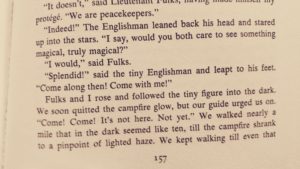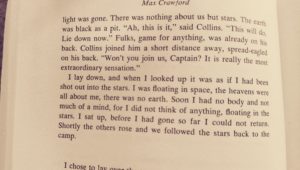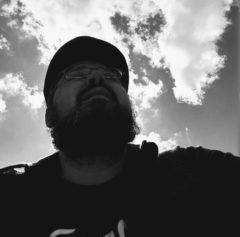
Over the course of her life, the fiction writer has found herself thinking about space. White space on the page, open space on the plains, empty space in the desert.
Outer space.
Inner space.
We must leave room inside us for our visions and dreams to play out like the dramas they are. But what does that mean, leave room? We don’t create our visions and dreams. At best, we work with our lives to negotiate some kind of shape. But the stuff they are made of – we didn’t make that. That is the stuff with which we’re made.
It was always there.
Here.
Similarly, we can try to leave room in the night sky for new stars, but there’s a lot of light up there – and it’s too far away for anything but witness.
She wishes she could put these thoughts down somehow, into stories, into narrative, but these days – ever she since she tried her hand at memoir – she always seems to fall back on philosophy.
The empty space in a bottle of wine lets the wine breathe, opens it up to its own complexities. Opens its complexities to us.
She rises from her sofa, puts her glass in the sink, corks the remainder of the bottle.
***
Once, when she was still young, she took a trip out West, her and a couple of friends. They stopped in Lubbock to meet a poet who had recently received some attention nationally, for his second book, The Space Between.
One of the three nights they spent, the last night, after much wine, he drove her out of town, alone. Her friends stayed behind. They drove a long time, turned off on a dirt road, kept driving, until she was not herself, but a perspective outside herself, and she could view their car from a distance: its lights plumbing the depths of the dark air around them. It occurred to her that the consistency of the air itself was really but degrees of difference to the emptier consistency of outer space; the fuller consistency of the ocean depths.
This should do, the poet said, pulled off to the side.
Should I be nervous? she smiled. You’re not taking me out here to murder me, are you?
He didn’t answer, he cut the motor, got out of the car, and she followed. All was calm, so calm and silent that she had the feeling she was treading on sacred ground and that her joke had been somehow profane.
They didn’t go far before he told her to stop.
Lie back, he said.
She couldn’t see, but felt a shift in the air, knew he had sat down on the ground.
Here?
Again, he didn’t answer, but she did as he did. And as soon as she did, there was nothing but stars. She was floating in space, the heavens all about her, the earth slowly drifted away. Soon her body did the same, then her mind, and she was nothing, adrift somehow in her own melt. After a time, she sat up, afraid she would lose herself entirely.
Some months later, the poet killed himself. She often found herself wondering if maybe he had spent too much time out there. The Staked Plain, it was called, only in Spanish. To this day, she couldn’t hear the Spanish for it without having a chill.
She had tried to write about this, but it never came out right. In the short story she wrote, she and the poet had made love, populated the universe with their own explosion. She never found an ending for it though, and besides, magical realism was passé. In her abandoned novel about the ghost of Manifest Destiny and the 1970s, he had made advances towards her, and she had been afraid and turned him down. In one of her few experiments with erotica, she made advances towards him, but she never could figure out a way for him to accept that felt realistic.
The reality was, after she sat up, they soon left. They rode back to town in silence, and he dropped her off at the motel where she was staying with her friends.
The next morning they continued on to California.
***
Ever since that night with the poet, the fiction writer has contemplated spaces. The spaces between people, the spaces between words, between texts, between breaths. And she has never once been satisfied with any beginning or ending she wrote, knowing the truth: that all stories begin and end in the same way

